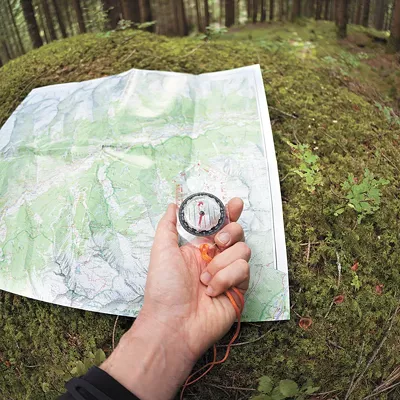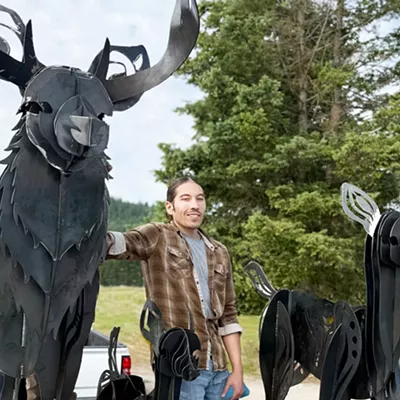
It's getting dark. Fast.
Traffic on I-90 is relentless, even on a Thursday night. It smells like exhaust fumes and dry grass, and we can’t find what we’re looking for.
It’s supposed to be here, on a Centennial Trail bridge, right next to the freeway entering Coeur d’Alene. But we have no idea what it’s supposed to look like, what it contains, or what the hell we’re doing.
We’re geocaching.
We think.
Geocatching isn’t new. The GPS-assisted treasure hunt was invented in Oregon in 2000 and now has millions of players worldwide, according to geocaching.com, the main site for the game.
Here’s how it works: Go online, type in your city or ZIP code to find nearby caches, choose the ones you want to find and plug the coordinates into a GPS device. Then, get out there, soak up nature (or the freeway) and find cool stuff.
But now there’s an app for that. Where before geocachers had to buy dedicated GPS devices, which run in the hundreds of dollars, today GPS location is built into most cellphones. Experts say GPS devices may be better for devotees (they’re more precise, more rugged and their battery life is longer), but smartphones are just fine for beginners. So those of us with no money and little experience hiking, navigating or making all-around secret mischief can geocache, too. (For the record, there’s also an app that turns your phone into a flashlight, which, if your timing is like ours, you’ll need.)
The rules and etiquette are simple: If you take something, leave something. Try not to let anyone see you. Be nice to nature.
There’s handicap-accessible geocaching and extreme geocaching, kid-friendly hides and multi-location hides with riddles and math equations that you have to solve to find the final prize.
The caches range from thumbnail-sized magnetic containers to foot-long army ammo boxes. The stuff inside is usually bizarre and worthless: Mardi Gras beads, a can of Chef Boyardee Beeferoni, a tiny Canadian flag pin. Sometimes there’s a dollar or a U.S. stamp.
According to Rick Washburn, a geocacher and assistant manager at REI, I’m not the only fan of random kitsch hidden around the Inland Northwest. He says Eastern Washington and North Idaho are home to thousands of geocachers, though it’s hard to tell exactly how many. The diversity of the game makes it popular for just about everyone, and the outdoor opportunities in the region make it a natural fit.
“It’s really a Northwest sport,” he says. But as smartphones have enabled more people to play the game, there are more inexperienced people traipsing around looking for treasure. And some of them won’t be dedicated enough to follow the rules, Washburn says. If they’re not looking out for “muggles” (nongeocachers), they could give away the locations and make the caches vulnerable to vandalism. If they don’t bother to report lost caches, there’s no point at all. If they’re not dedicated to the “leave no trace” principles of the game, he says, they might litter or damage the land.
“There’s not a police force,” Washburn says. “Everybody kind of has to work together.”
When beginners come to him for geocaching advice, Washburn suggests geocaching.com but warns against wasting time online.
“Get into the website. There is a lot of great information and presentations,” he says. “And then get out there in nature and geocache.
That’s the fun of it.”
And so, two friends and I have stumbled from Tubbs Hill in downtown Coeur d’Alene to Manito Park on the South Hill for the past week trying to find, well, anything. It’s been like a game of hide-and-seek with patience. Just when you think you’re about to find something, you don’t. And when you’re about to give up and throw your “smart” phone into a duck pond, you find a wellhidden treasure that is just enough to restore your dignity and sense of wonder.
Granted, there is something strange about it all — it feels simultaneously aimed at nature-loving hippies and online gaming nerds. But somehow that’s OK.
After all, it only took us three days to go from yelling obscenities next to the freeway (we never found what we were looking for) to trading a 50-cent Euro for a picture of a kitten.
We don’t want to give away any secrets, but you can find caches in our area at geocaching.com.
Map Apps
If you already have some geocaching experience, there are supplemental apps to help with advanced caches, like those with riddles and equations. (GPS Compass, iMarkMySpot and Geocaching Tools are top picks.) But newbies will need a full-service app with maps, descriptions and hints for nearby caches. Here are a couple that we tried:
c:geo — ANDROID
This isn’t geocaching.com’s official app, but it’s linked to the site, so you’ll have access to all the same caches and info. It did show a handful of caches not on the official app and when we tried one, it wasn’t there. But overall, this free app was user-friendly and kept up with the official app. (Download the version developed by “carnero.”
Geocaching — IPHONE
The full, $10 version of this app (there’s a vastly inferior trial version) was intuitive, detailed and easy to navigate. Its distance measurements were more precise than Android’s c:geo, but only by a little. The app tries to do a lot at once, though, so sometimes it runs slow. Some reviews say it can crash mid-cache, but ours worked fine. (Download the version developed by Groundspeak Inc.)



















